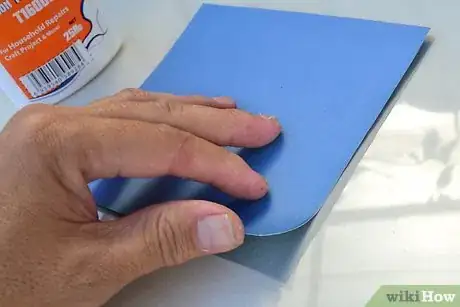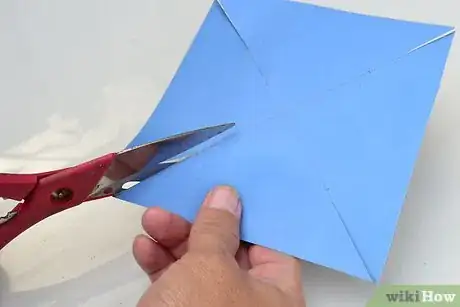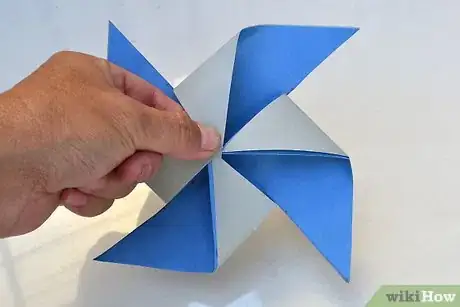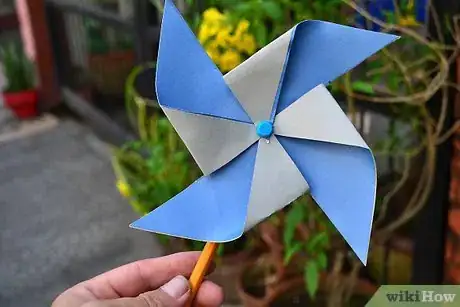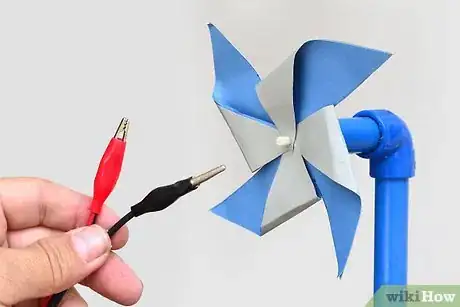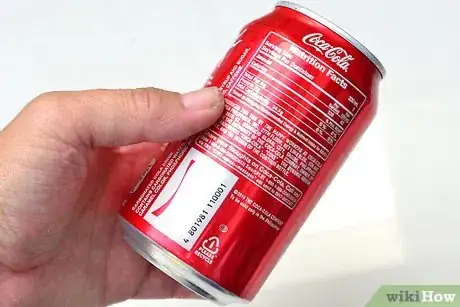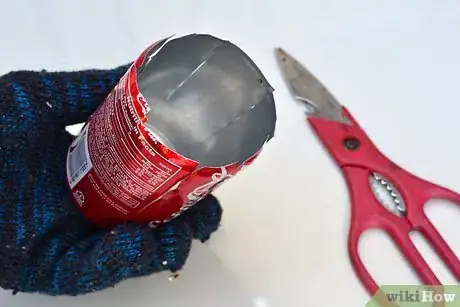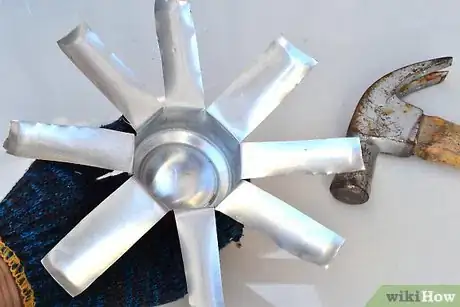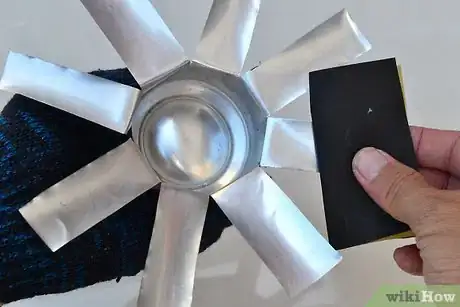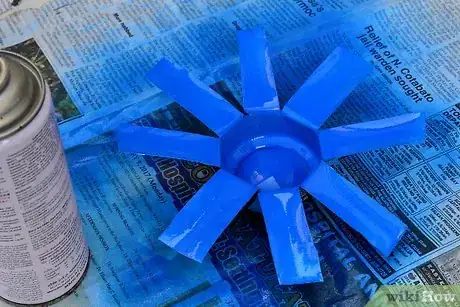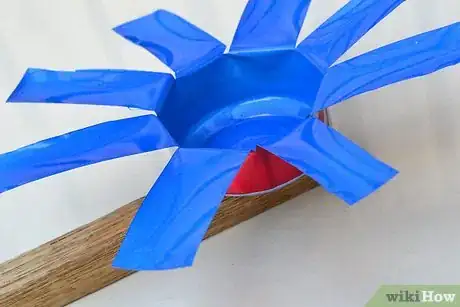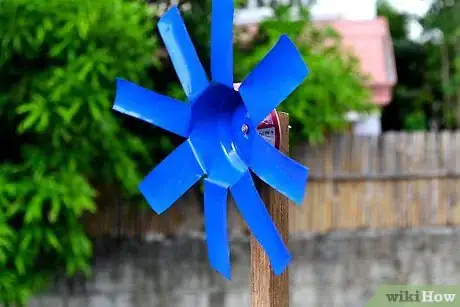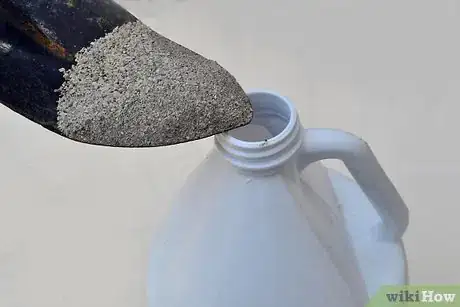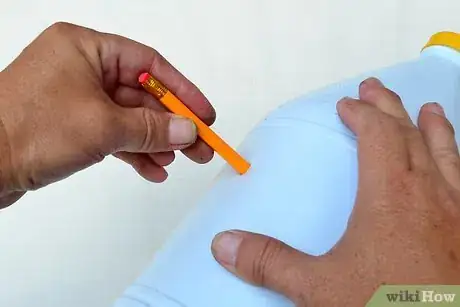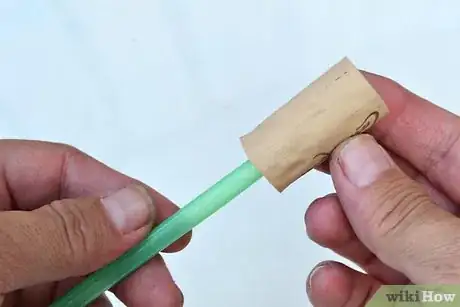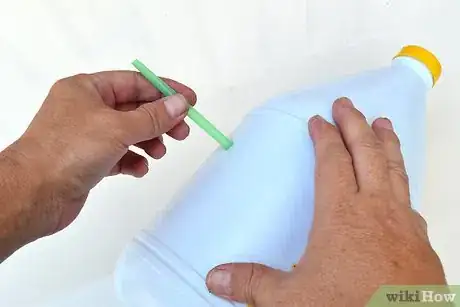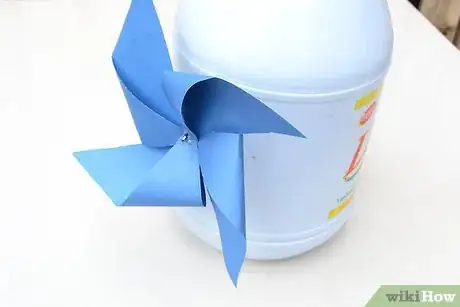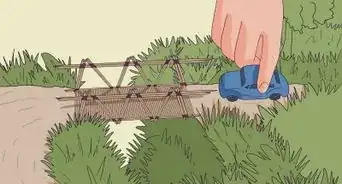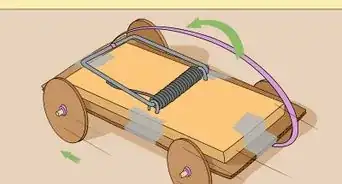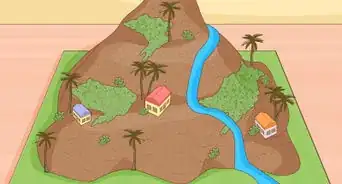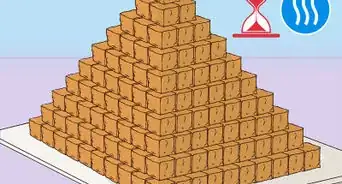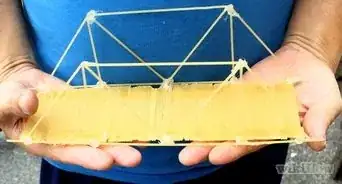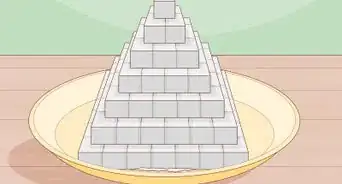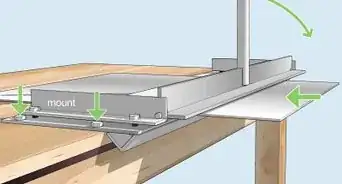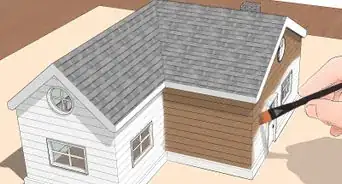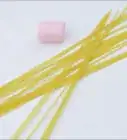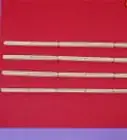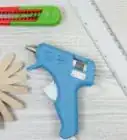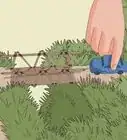wikiHow is a “wiki,” similar to Wikipedia, which means that many of our articles are co-written by multiple authors. To create this article, 52 people, some anonymous, worked to edit and improve it over time.
This article has been viewed 832,461 times.
Learn more...
Building a working scale-model of a windmill is a great craft project for school or just for fun! Create a basic pinwheel model, assemble a tin can windmill, or build a windmill with a milk jug base! Once you've got your windmill assembled, observe how the spinning blades convert wind into energy!
Steps
Constructing a Basic Pinwheel
-
1Glue 2 squares of paper together. Cut each sheet of paper into a 14 cm square. Glue the 2 squares of paper together—make sure the patterned or colored side of the paper is facing out. Allow the glue to completely dry.[1]
-
2Measure and cut the blades. Retrieve your ruler and pencil. Place the ruler on a diagonal between 2 corners. Lightly draw a diagonal line from 1 corner to the other. Lightly draw a diagonal line between the remaining 2 corners to create a “X.” Make a 5 cm cut along each line—from the corner towards the center.[2]Advertisement
-
3Fold and glue the corners in the center of the pinwheel. Carefully fold 1 corner at a time towards the center. Dab a dot of glue on the center of the pinwheel and adhere the corner. Hold the corner between your thumb and forefinger until it dries. Fold and glue the remaining 3 corners.[3]
-
4Attach a straw to the pinwheel with a thumb tack. Once the glue has dried, position the plastic straw along the center of the backside of the pinwheel—the top of the straw should not poke out above the top of the pinwheel. Secure the straw to the pinwheel by inserting the thumbtack through the center of the pinwheel and the plastic straw.[4]
-
5Attach a motor to the pinwheel to create a power-generating windmill. Remove the pinwheel from the straw.
- Place 3 to 4 strips of masking tape over the center of the pinwheel.
- Insert the shaft of a small motor and cover the end of the shaft with a cap, piece of cork, or a small blob of clay.
- Connect the motor wires to the light bulb with alligator clip leads.
- Hold the pinwheel in front of a fan and witness the lighting of the bulb!
Constructing a Tin Can model Windmill
-
1Determine the width of your blades. Before starting the project, wash and dry your tin can thoroughly. Measure the can’s circumference and evenly divide the can into 6 or 8 lengthwise parts—these will become the blades of your windmill. Use a permanent marker to mark these segments on the can.[5]
-
2Cut the blades. Put on your safety goggles and gloves. Use your scissors to carefully cut along the outline of each blade. Stop cutting ½ in from the bottom of the can.[6]
-
3Straighten and flatten the blades with a hammer. With your gloved hands, carefully bend each blade down towards the surface you are working on. Retrieve your hammer. Place the tin can on the ground and gently tap each blade until it is flat.[7]
-
4Sand the tin can. Keep your gloves on and grab the sandpaper. Slowly run the paper over the front and back surface of the can. Pay particular attention to sanding the edges.[8]
- Sanding the can will allow the paint to adhere to the surface.
-
5Spray paint the tin can. Spread newspaper or cardboard on the ground. Place the tin can on the covered surface. Put on your protective mask. Spray a thin layer of paint over the blades and center of the tin can. Allow the paint to dry before applying 2 coats of polyurethane spray.[9]
-
6Position the wooden dowel underneath the tin can. Retrieve the dowel. Lay the tin can windmill on top of the wooden dowel. The dowel should intersect the tin can blade’s center.[10]
-
7Nail the center of the blades to the dowel. Hold the wooden dowel in place—ask a friend or an adult to help. Tap a nail through the center of the tin can and into the wooden dowel. Wiggle the nail around to create a larger hole. This will allow the blades to turn.[11]
Constructing a Milk Jug Windmill
-
1Wash and dry the milk jug. Wash the milk jug with soapy water. Rinse it out with clean water several times. Leave it to dry upside down over a towel.
-
2Fill the milk jug with gravel. Once dry, flip the jug over. Measure out 2 cups of gravel—dried beans would work too. Carefully pour the gravel into the milk jug.
-
3Poke 2 holes through the milk jug. Retrieve your sharp pen or pencil. Place the sharp end of the writing instrument halfway up the side and in the center of the jug. Poke it through 1 side and out the other to create 2 parallel holes.[12]
-
4Attach the straw to the cork. Push 1 end of the straw through the middle of the wine cork. Make sure it is a tight fit! If you straw is made of soft plastic, you may need to carve out a bit of the cork in order to insert the straw.
-
5Insert the straw and attach the pinwheel. Push the end of the straw without the cork through holes in the base. Use a paperclip, or glue, to attach the pinwheel to the end of the straw without the wine cork. Make sure the pinwheel can spin freely without falling off.[13]
-
6Attach a paperclip to a string and tie the string to the wine cork. Cut a length of thread between 24 and 32 inches long. Tie one end around the wine cork. Attach the other end to the second paper clip. Blow on the pinwheel, set it outside, or place it in front of a fan and observe what happens to the paperclip![14]
Community Q&A
-
QuestionIs there an easier method to make a model windmill in one day?
 Community AnswerYou can easily make a windmill with these steps. Cut out two rectangles and paste them on top of each other like a cross shape. Easily make a body of a windmill with a hexagon and polygons extending down from the sides of the hexagon. Use a sharp object to make a hole in the middle of the cross section of the fan. Use a motor, battery (in a battery holder), switch and wires to connect them all together. The order does not matter. Figure out this circuit for it is exceptionally easy; just connecting it all.
Community AnswerYou can easily make a windmill with these steps. Cut out two rectangles and paste them on top of each other like a cross shape. Easily make a body of a windmill with a hexagon and polygons extending down from the sides of the hexagon. Use a sharp object to make a hole in the middle of the cross section of the fan. Use a motor, battery (in a battery holder), switch and wires to connect them all together. The order does not matter. Figure out this circuit for it is exceptionally easy; just connecting it all. -
QuestionWhat is card stock paper?
 Community AnswerCard stock, also called cover stock or pasteboard, is a paper stock that is thicker and more durable than normal writing or printing paper, but thinner and more flexible than other forms of paperboard.
Community AnswerCard stock, also called cover stock or pasteboard, is a paper stock that is thicker and more durable than normal writing or printing paper, but thinner and more flexible than other forms of paperboard. -
QuestionWhat kind of motor would I need for this windmill?
 Community AnswerYou will need a DC Motor of 6 volts or above. Any motor below 6 volts won't light up the LED or whatever you have connected.
Community AnswerYou will need a DC Motor of 6 volts or above. Any motor below 6 volts won't light up the LED or whatever you have connected.
Things You’ll Need
Constructing a Basic Pinwheel
- 2 pieces of cardstock paper—pick any pattern or color!
- 1 plastic straw
- Glue
- Pencil
- Ruler
- 1 thumb tack
Constructing a Tin Can model Windmill
- 1 empty tin can with the top removed
- Protective eye-wear
- Work gloves
- Protective mask
- Scissors
- Sand paper
- Old newspapers or cardboards
- Spray paint
- Polyurethane spray
- 1 wooden dowel
- 1 nail
Constructing a Milk Jug Windmill
- 1 ½ gallon plastic milk jug
- 2 cups of gravel
- Sharp pen or pencil
- Plastic straws that do not bend
- 1 wine cork
- 1 pinwheel
- 2 paperclips
- White thread
References
- ↑ http://www.womansweekly.com/craft/how-to-make-a-paper-windmill-10753/
- ↑ http://www.womansweekly.com/craft/how-to-make-a-paper-windmill-10753/
- ↑ http://www.womansweekly.com/craft/how-to-make-a-paper-windmill-10753/
- ↑ http://www.womansweekly.com/craft/how-to-make-a-paper-windmill-10753/
- ↑ http://scienceofeverydaylife.com/families/pdfs/activities/Make-a-Model-Windmill.pdf
- ↑ http://scienceofeverydaylife.com/families/pdfs/activities/Make-a-Model-Windmill.pdf
- ↑ http://scienceofeverydaylife.com/families/pdfs/activities/Make-a-Model-Windmill.pdf
- ↑ http://scienceofeverydaylife.com/families/pdfs/activities/Make-a-Model-Windmill.pdf
- ↑ http://scienceofeverydaylife.com/families/pdfs/activities/Make-a-Model-Windmill.pdf
- ↑ http://scienceofeverydaylife.com/families/pdfs/activities/Make-a-Model-Windmill.pdf
- ↑ http://scienceofeverydaylife.com/families/pdfs/activities/Make-a-Model-Windmill.pdf
- ↑ http://www.sciencefairadventure.com/ProjectDetail.aspx?ProjectID=229
- ↑ http://www.sciencefairadventure.com/ProjectDetail.aspx?ProjectID=229
- ↑ http://www.sciencefairadventure.com/ProjectDetail.aspx?ProjectID=229
- Videos provided by Learn - How To Make
About This Article
To prepare a working model of a windmill, you can create a basic pinwheel out of card stock and pin it to a handle with a thumb tack. Alternatively, cut the top off a soda can and trim the sides into 6 equal sections. Then, bend the sides down to form the propellors of your windmill. To make a base for your windmill, fill a big milk bottle with gravel and attach your pinwheel to it. Or, attach it to the shaft of a small motor if you want a power-generating windmill. For more tips, including how to make a windmill model step by step, read on!
